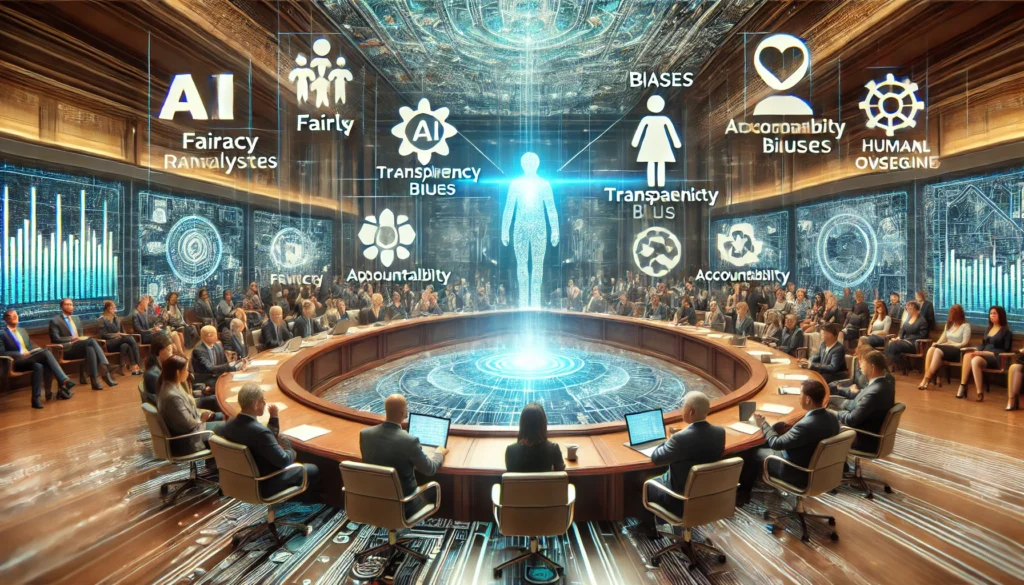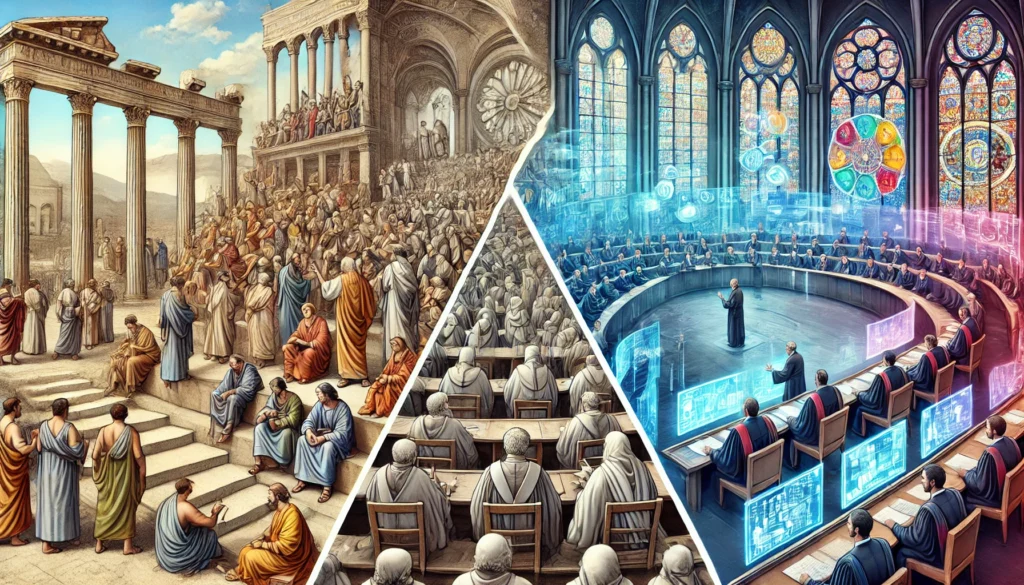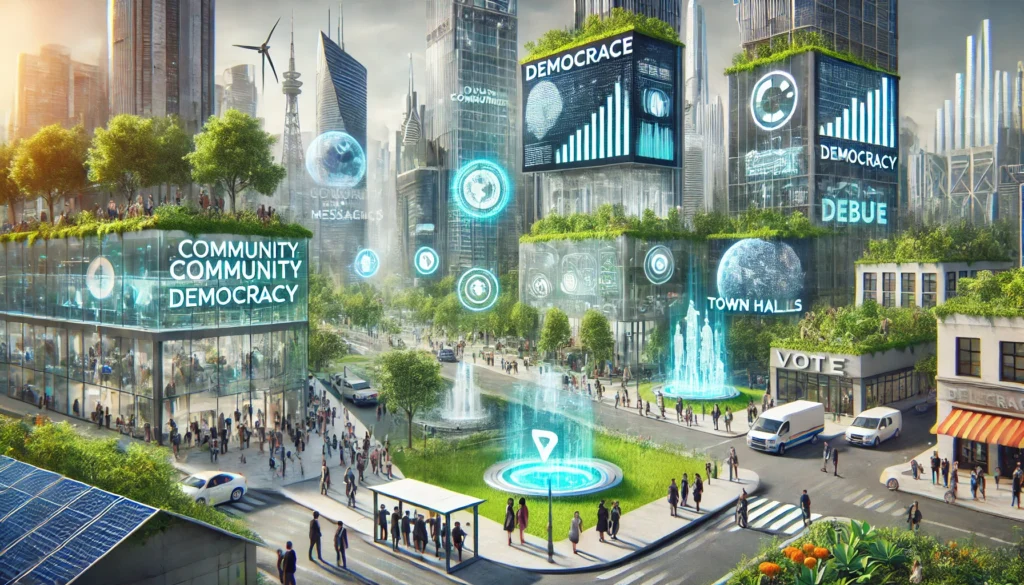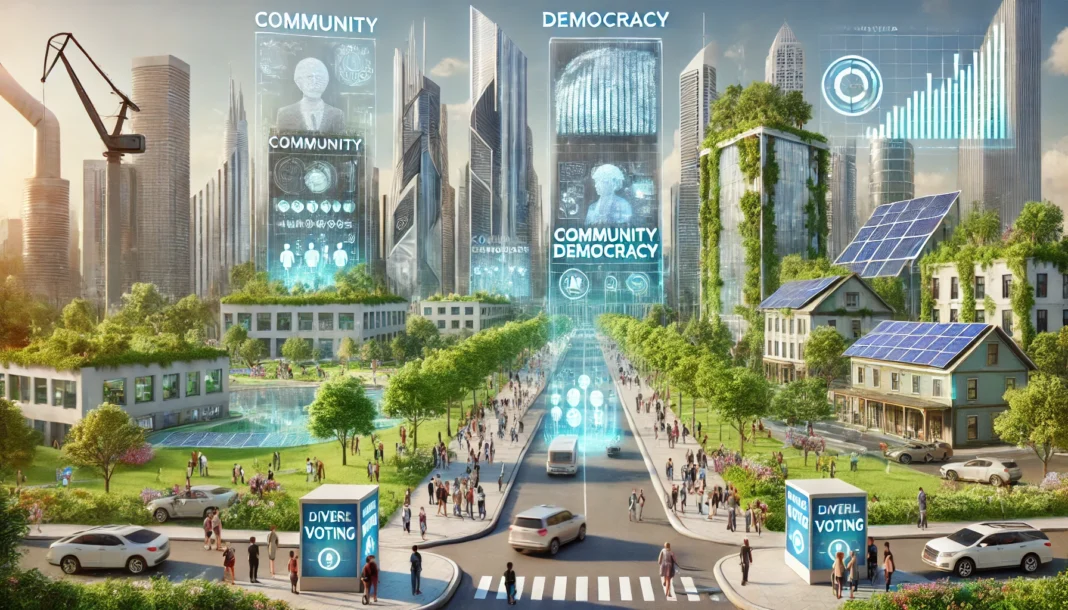Democracies, as we know them, are evolving. So, what do the democracies of the future look like? How do they tackle the challenges of the 21st century, incorporate technology, and adapt to the needs of a changing society? Let’s dive deep into the future of governance and see how it could impact you.
Introduction To Democracies Of The Future
You might think democracy is just about casting a vote and hoping for the best. However, future democracies will be far more nuanced, inclusive, and technologically advanced. They will integrate digital tools, involve AI-driven policy decisions, and enhance participatory platforms. Instead of waiting for election cycles, people will provide real-time input to shape governance.
This shift means that democracy will no longer be an occasional engagement; it will become an ongoing process. Citizens will have numerous opportunities to contribute, share insights, and influence decision-making regularly. Technology will serve as a bridge, connecting governments with the voices of the people more efficiently.
As a result, future democracies promise a closer relationship between citizens and their leaders. This will ensure that governance is more responsive, agile, and in tune with the immediate needs of the public. The days of distant, top-down control are giving way to more interactive, people-centred systems.
The Evolution Of Democratic Governance
Early Forms Of Democracy And How They’ve Changed
Democracy isn’t a new concept. The Greeks started it with the idea of citizen involvement, though it was limited. However, the modern wave of democracy expanded rights to more people, ensuring each citizen could contribute to governance. This evolution was pivotal in making democracy more inclusive and accessible to a broader audience.
In today’s world, the transformation has advanced even further. Digital democracy and participatory governance are reshaping how we engage with political systems. Citizens now have more opportunities to participate actively in the governance process, beyond just casting a vote. Digital platforms are creating new avenues for involvement, enabling more frequent interaction with decision-makers.
Moreover, these changes mean that democracy is no longer confined to election periods. People can share their thoughts, ideas, and feedback continuously, making governance more dynamic and responsive. The future is about everyone having a voice, always.
What are the Key Drivers of Democratic Transformation
What’s driving this evolution? For one, technology has played a major role. The internet has made knowledge more accessible, putting power directly in people’s hands. Moreover, citizens are no longer passive recipients; they are now active participants. They are shaping how governance unfolds through digital channels, platforms, and activism.
Another key factor is economic change. Economic shifts and growing inequality have raised pressing questions about governance and justice. This has triggered new debates and discussions, propelling citizens to engage more actively. People now demand fairer systems that address these inequalities head-on.
Additionally, technological advancements have fueled a shift in mindset. With more access to information, people feel more empowered. They expect transparency, accountability, and a voice in decision-making. These factors together drive the evolution of democracy towards a more inclusive and participatory model.

How Technology is Reshaping Democracy
The Rise of Digital Voting Systems
Forget queuing up at polling stations. Democracies of the future are making voting as simple as tapping a button. Digital voting systems promise speed, efficiency, and accessibility for everyone. Estonia, for example, already has a well-established e-voting system, setting a benchmark for digital democracy across the globe. This convenience means more citizens can participate without logistical barriers, making democracy more inclusive.
However, with these new opportunities come new challenges. Safeguarding against hacking is crucial to maintain voter trust and system integrity. Ensuring that every vote is properly accounted for requires advanced security protocols and constant vigilance. Governments must invest in cybersecurity to protect democratic processes from malicious threats.
Furthermore, transparency is key to building confidence in digital voting. Citizens need assurance that their votes are secure, counted accurately, and handled ethically. Addressing these challenges is vital for the success of digital democracy in the future.
Social Media’s Influence on Public Opinion
The power of a tweet, a TikTok, or a viral post cannot be underestimated. Social media has become both an asset and a challenge for democracy. On the positive side, it amplifies diverse voices, giving people a platform to share their opinions. However, it also has a darker side, sometimes driving polarization and deepening divides.
The influence of social media has blurred the lines between governance, misinformation, and genuine public debate. False information can spread faster than facts, complicating public understanding of important issues. Democracies of the future must navigate this complex landscape with caution, balancing the benefits of open dialogue with the dangers of misinformation.
To move forward, it is essential to educate citizens on digital literacy and critical thinking. This will help empower people to engage meaningfully without falling prey to manipulation. Careful regulation and public awareness can ensure social media becomes a tool for progress, not division.
Challenges Facing Democracies In The 21st Century
Combating Misinformation And Fake News
Misinformation is democracy’s worst nightmare. It undermines trust, weakens institutions, and spreads confusion among the public. Future democracies must contend with fake news in real time, making digital literacy more important than ever. Citizens must learn to differentiate between credible sources and falsehoods.
Imagine a world where critical thinking is as essential as basic reading. This is what the future demands if democracies are to thrive. Education systems need to prioritize digital literacy, teaching young people how to verify facts and think analytically. By doing so, citizens can make informed decisions and avoid manipulation.
Moreover, governments and tech companies must collaborate to fight misinformation. This includes stricter regulations on platforms and promoting transparency. Only by working together can we ensure that democracy remains resilient in the face of misleading information. A well-informed public is the foundation of any thriving democracy.

Managing Political Polarization In A Digital Age
As debates get louder, political divides continue to deepen, making consensus harder to achieve. The democracies of the future face the challenging task of bridging gaps created by algorithms that often favour conflict over consensus. These algorithms tend to prioritize sensational content, which fuels polarization and increases divisions among different groups.
To overcome these divides, democracies must adopt new ways of fostering dialogue. This means creating platforms that encourage constructive conversations, rather than confrontational ones. Bringing people together to genuinely listen and understand different perspectives is crucial. It requires creating safe spaces where citizens feel heard without fear of backlash.
Furthermore, education plays an essential role in bridging these divides. By promoting empathy, critical thinking, and media literacy, democracies can help citizens engage more thoughtfully. Ultimately, the goal is to replace reactionary responses with meaningful dialogue that fosters unity and collaboration.
The Role of AI And Digital Tools In Future Democracies
AI-Driven Policymaking And Its Ethical Concerns
Here’s where things get interesting. Imagine artificial intelligence sifting through data and suggesting policies based on what’s best for the community. It sounds ideal, right? However, AI comes with a range of ethical concerns that must be addressed.
First, there is the question of data ownership. Whose data is being analyzed, and is it being used ethically? Without clear guidelines, AI systems risk violating individual privacy. Moreover, data security is essential to protect citizens from unauthorized access or exploitation.
Second, bias in AI is a significant concern. Algorithms are created by humans, and they can inherit biases from their creators. If not carefully managed, these biases could lead to unfair policies that discriminate against certain groups. Democracies of the future must prioritize transparent, accountable AI systems that serve every citizen equally, ensuring that technology remains a force for good, not division.

Data Privacy in a Digital Democracy
Privacy is a key issue, especially in the digital age. Democracies must grapple with the double-edged sword of collecting data for better governance while ensuring individual freedoms aren’t compromised. On one hand, data collection allows governments to understand citizens’ needs better and offer tailored services. On the other hand, mishandling data can lead to breaches of privacy and loss of trust.
Balancing openness with privacy protections is a challenging task that requires thoughtful regulation. Governments must establish clear guidelines on what data can be collected and how it will be used. Transparency is crucial to ensure citizens feel secure in sharing their information without fear of misuse.
Moreover, collaboration with technology companies can help create stronger data protection systems. By working together, both public and private sectors can ensure that privacy rights are safeguarded while still enabling innovation and effective governance.
Innovations in Participatory Democracy
Participatory democracy is about much more than just voting. It’s about you actively getting involved, sharing your ideas, and directly influencing policy decisions. In future democracies, citizens will have greater opportunities to contribute beyond the voting booth.
For example, future democracies could have citizens participating in regular polls, allowing them to voice their preferences on important issues. Engaging in online debates will also enable people to discuss policies, share their perspectives, and challenge opinions constructively. Moreover, online platforms could facilitate direct collaboration with government officials, giving citizens a say in shaping decisions that impact their lives.
This kind of participation makes democracy more dynamic and responsive. It shifts power closer to the people, ensuring decisions reflect the will of the majority. By involving citizens in every step, participatory democracy aims to create governance that is transparent, accountable, and inclusive for all.
Future Models Of Governance: Beyond Traditional Democracy
Traditional democracy is getting an upgrade, evolving to meet modern needs. Hybrid models that blend representative and direct democracy are emerging, aiming to solve some inefficiencies of traditional governance. These new models promise more flexibility, allowing citizens to have a more direct impact while still benefiting from experienced leadership.
Moreover, the role of technology is growing in these emerging systems. Could we see AI become an “advisor” to elected representatives? Imagine AI analyzing complex data sets to provide unbiased insights, guiding leaders in making informed decisions. This combination of human judgment with machine efficiency could potentially enhance decision-making processes.
The future of governance might be more collaborative between human wisdom and machine precision than we could have imagined. By leveraging AI, governments could create more responsive systems that cater better to public needs, while still upholding democratic values and accountability.
Global Perspectives On The Future Of Democracy
How Different Regions View Democratic Evolution
Not all democracies evolve in the same way, and each country’s path is unique. While some nations leap towards tech-based governance, embracing rapid changes, others take a slower, more cautious approach to ensure stability. This difference in pace often depends on the political culture and historical context of each region.
The political culture of a region plays a huge role in shaping what future democracy will look like. For example, Scandinavia is pioneering in transparency, promoting open governance that fosters trust and accountability. Their emphasis on citizen engagement and digital tools sets a benchmark for others.
On the other hand, some nations are still battling fundamental democratic freedoms. These countries face challenges like limited citizen rights, restricted media, and political instability. Their cautious approach to adopting new governance models is often influenced by a need to first secure basic democratic rights before advancing further.
Case Studies of Democracies Adapting to Change
Take Taiwan’s digital democracy model. By embracing participatory platforms and involving citizens directly in discussions, they’ve managed to create a more transparent and engaged government. These case studies serve as blueprints for other countries to emulate or adapt according to their specific needs.
The Impact of Youth Movements on Democratic Evolution
It’s no secret: young people are driving significant change. Youth-led movements, from climate strikes to social justice protests, are reshaping democracy’s future in unprecedented ways. This generation is tech-savvy, socially aware, and unafraid to challenge the status quo. They demand a seat at the table, refusing to be passive participants in political processes.
Younger generations are also less trusting of traditional political institutions. They seek transparency, direct involvement, and immediate action on pressing issues like climate change, equality, and justice. Their scepticism of old systems is pushing governments to rethink how they engage citizens and adapt to new forms of participation.
The future democracies will be built largely by these driven, determined young voices. Their energy and willingness to innovate will ensure that democracy evolves to become more inclusive, more responsive, and more in tune with the values of a changing society.

What Does the Future Hold for Democracies Around the World?
Are we looking at a future where every citizen becomes a decision-maker? Or where AI acts as the mediator between conflicting interests and makes governance more efficient? Democracies of the future are on the brink of radical change, driven by technology, social demands, and evolving expectations.
This change could mean moving away from the bureaucracy-heavy models that characterize governance today. Instead, we could adopt more streamlined, agile, and inclusive forms of governance. These future systems would prioritize citizen involvement, ensuring that every individual has a direct role in shaping decisions.
Moreover, AI could help bridge gaps where human biases have traditionally hindered progress. By providing data-driven insights and reducing inefficiencies, AI might foster a more transparent, responsive system. Ultimately, the democracies of tomorrow aim to balance human judgment and technological precision for more equitable and effective governance.
FAQs about Democracies of the Future
What Are The Key Features Of Future Democracies?
How Will Technology Impact Democratic Governance?
What Challenges Do Future Democracies Face?
Will AI Play A Role In Future Democracies?
How Can Digital Tools Enhance Participatory Democracy?
What Are Some Examples Of Emerging Democratic Models?
How Will Youth Movements Influence The Future Of Democracy?
What Is Digital Democracy And How Does It Work?
How Are Global Trends Shaping The Evolution Of Democracy?
What Are The Ethical Considerations Of AI In Democratic Decision-Making?
Are We Ready for the Democracies of Tomorrow?
Here’s the million-dollar question: are we ready for this future? The democracies of tomorrow are likely to be more transparent, more tech-driven, and far more participatory than anything we have seen before. However, this future will not be without significant hurdles. Issues such as privacy concerns, misinformation, and polarization are just a few of the challenges we must overcome.
To address these challenges, we need a thoughtful approach that prioritizes both technological innovation and democratic values. Privacy must be safeguarded, ensuring that citizens’ data is protected while still allowing for efficient governance. Meanwhile, combating misinformation will require a combination of education, regulation, and collaborative efforts between governments and technology platforms.
Ultimately, the key lies in balancing technological advances with core democratic principles. This will help ensure that governance remains by the people, for the people, and with the people—even if the methods evolve significantly.

